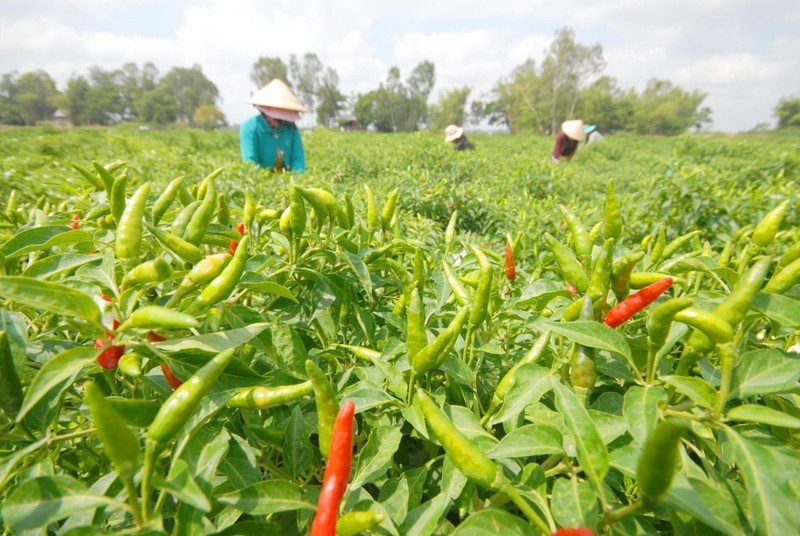In recent years, the RoK's demand for importing agricultural, forestry, and fishery products from countries around the world has been quite large. The RoK currently imports many items from Vietnam, such as rice, seafood, coffee, wood, and vegetables.
Diverse import demand
According to data from the Institute for Policy and Strategy for Agriculture and Rural Development, accumulated in the first five months of 2023, Vietnam's exports of wood and wood products to the Korean market hit 328 million USD, reaching 32.2% turnover in 2022.
Currently, the RoK's import demand for wood products is growing rapidly. In the first 6 months of 2023, the RoK's imports of wood and wood products from world markets increased by 16.8% in volume over the same period in 2022.
Vietnam's accumulated seafood exports to the RoK in the first five months of 2023 reached 293.6 million USD, reaching 30.9% of the turnover in 2022; fruit and vegetable exports reached 86.4 million USD, equivalent to 47.8% of the turnover in 2022; rice exports reached 15.3 million USD, 45.5% of the turnover in 2022, with a total output of 31.5 thousand tonnes, reaching 47.9% of the volume in 2022; while cassava and cassava products reached 24 million USD, equal to 44.9% of the turnover in 2022.
For coffee, according to data from the International Trade Centre, in the first six months of 2023, the RoK's imports from markets around the world reached 92.93 thousand tonnes, worth 547.83 million USD, down 0.3% in volume and 3.6% in value from the same period in 2022.
The supply of coffee to the RoK is quite diverse, coming from more than 50 countries and territories, with Brazil, Vietnam, Colombia, and Ethiopia among the main suppliers.
In the first six months of 2023, the RoK also increased its coffee imports from Vietnam, increasing by 21.4% in volume and 6.9% in value over the same period last year, reaching nearly 21.27 thousand tonnes, worth 43.8 million USD. Vietnam's coffee market share in the RoK's total imports increased from 18.79% in the first six months of 2022 to 22.8% in the same period of 2023.
Opportunity to increase turnover
It is forecasted that in the last months of the year, many agricultural products of Vietnam will have the opportunity to increase export volume and turnover to the Korean market.
According to the Institute for Policy and Strategy for Agriculture and Rural Development, seafood exports to the RoK also decreased because inflation caused a decrease in demand, but not as deeply as other markets.
Many businesses still see an optimistic bright spot in this market, as Vietnam's processed products are not in competition with other countries.
In the coming months, when inflation gradually stabilizes, seafood exports to the Korean market will recover faster, making up for the sharp decline in markets.
Furthermore, products from cassava also have room in the Korean market. However, Vietnam's cassava is currently facing stiff competition for other export markets such as Thailand, Cambodia, and Laos, while most of Vietnam's cassava starch processing technology remains rudimentary.
Therefore, the Vietnam Cassava Association needs to study to improve the quality of cassava exported to the Korean market in order to limit the risks in export.
Particularly for fruits and vegetables, General Secretary of the Vietnam Fruit and Vegetable Association Dang Phuc Nguyen said that the RoK is also increasing its demand to import a variety of goods from Vietnam, including fresh and processed products. Exporters need to fully meet the import regulations of this market.
Specifically, for chili products, the Plant Protection Department (Ministry of Agriculture and Rural Development) has sent a notice of requirements of the RoK's Ministry of Food and Drug Safety, to the Departments of Agriculture and Rural Development of provinces, cities, plant quarantine sub-departments, and enterprises.
Accordingly, individuals and enterprises producing chili peppers in Vietnam that want to export to the Korean market must have the results of testing for pesticide residues by eight laboratories approved by the Korean Ministry of Food and Drug Safety. This requires Vietnamese exporters to regularly obtain updated information on the Korean market to avoid disruptions in goods trade.
















